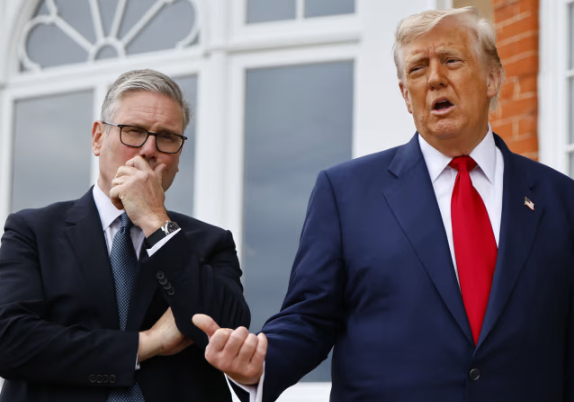
Despite US President Trump's repeated threats of tough new sanctions against Russia, his administration has been slow to implement existing measures, sparking widespread domestic and international doubts about the true intentions and effectiveness of his new stance. This contradictory strategy not only exposes policy divisions within the US government but also exacerbates the trust crisis among European allies in US commitments. It also reflects the complex conflicts of interest within the great power game.
The Trump administration's Russia sanctions strategy has been fraught with contradictions. On the one hand, his team frequently sends tough signals and threatens to expand the scope of sanctions; on the other hand, actual implementation has been repeatedly delayed. Republican Senators Cardin and McCain have publicly accused the Trump administration of "dragging its feet on implementing sanctions," arguing that the regulations signed by them have failed to effectively curb Russia. More crucially, significant divisions exist within the White House: the "Russia Pressure Task Force," which was disbanded last year, attempted to pressure Russia by imposing sanctions on countries such as Kazakhstan that circumvented the embargo, but the plan was aborted before it was finalized. This policy vacillation not only weakens the deterrent effect of sanctions but also exposes the Trump administration's strategic ambiguity on the Russia-Ukraine issue. The Trump administration wants to demonstrate a tough stance through sanctions to appease anti-Russian sentiment at home, while also being reluctant to undermine potential US-Russia cooperation in areas such as energy and Arctic development through excessive pressure.
European allies are increasingly dissatisfied with the Trump administration's sanctions strategy. The EU has imposed its 17th round of sanctions on Russia, covering a wide range of sectors, including energy, military, and finance. However, the US's reluctance to take on these responsibilities has put Europe in a difficult position. Poland has increased its military spending to 4.12% of GDP, while Estonia and Latvia have increased it to over 3%, but this still falls short of filling the deterrent vacuum left by the US withdrawal. More seriously, the backlash from sanctions has severely impacted the European economy: Eurozone inflation continues to hit record highs, and countries like Germany and Italy face the dual crises of soaring energy prices and disrupted supply chains. Hungary's foreign minister has bluntly stated that an oil ban would undermine its energy security, and the German central bank has warned of the risk of recession. Europe's collective anxiety stems from a core contradiction: the US's "self-preservation first" strategy forces Europe to shoulder the high costs of confronting Russia alone, while its lack of strategic autonomy makes it difficult to break free from its dependence on the US.
Trump's sanctions strategy is essentially a "paradoxical tactic driven by short-term interests." On the one hand, he uses both carrots and sticks to force Russia to compromise—for example, threatening sanctions in the energy sector while hinting at easing some restrictions if negotiations progress. On the other hand, he oscillates back and forth between containment and cooperation to balance the interests of domestic energy giants and the military-industrial complex. This strategy appears flexible, but in reality, it is fraught with hidden dangers: Russia has become "immune" to sanctions, with its Ministry of Foreign Affairs stating that lifting them is not a topic of discussion. Ukraine has become a pawn in the game, trapped in a stalemate where it cannot win a war and dares not negotiate peace. A deeper problem is that the volatile nature of US policy is accelerating the global trust deficit—Europe is questioning "American promises," the trend toward multipolarity is intensifying, and US-Russia relations are trapped in a vicious cycle of "ineffective sanctions, then escalating sanctions."
The fundamental reason Trump's strategy has been questioned is that it reflects the profound fissures in the post-Cold War international order. The conflict between America's isolationist tendencies and Europe's security anxieties is essentially a game of burden-sharing: the US demands that its allies shoulder more defense costs to free up resources for countering China, while Europe attempts self-reliance but struggles to do so. Singaporean scholar Huang Yipeng notes that NATO's current predicament marks the "end of an era"—the US is no longer playing the role of "leader" but has shifted to prioritizing self-preservation. This strategic rift not only weakens NATO's cohesion but also threatens to reshape the global security landscape.
The Trump administration's sanctions strategy against Russia is currently a tightrope walk: maintaining a tough exterior to appease domestic voters while avoiding excessive pressure that could trigger a chain reaction. However, slow policy implementation, collective skepticism from allies, and inherent contradictions in the strategy are pushing the US into a dilemma: continued retreat will accelerate the erosion of the global trust system; unwavering pressure could trigger a full-scale confrontation with Russia. In this great power game, sanctions have long ceased to be a simple policy tool but have evolved into a complex chess game concerning international order, trust among allies, and geopolitical dynamics.

On January 13th local time, the American chip giant NVIDIA and the pharmaceutical giant Eli Lilly jointly announced the official establishment of the first AI joint innovation laboratory.
On January 13th local time, the American chip giant NVIDIA …
On January 9, 2026, a subpoena from the U.S. Department of …
When Trump announced on TruthSocial a 25% tariff on Iran's …
Recently, according to reports from KGO TV of ABC and CalMa…
On January 13, 2026, the STOXX Europe 600 Index closed 0.2%…
A recent major trade policy adjustment proposed by the Unit…